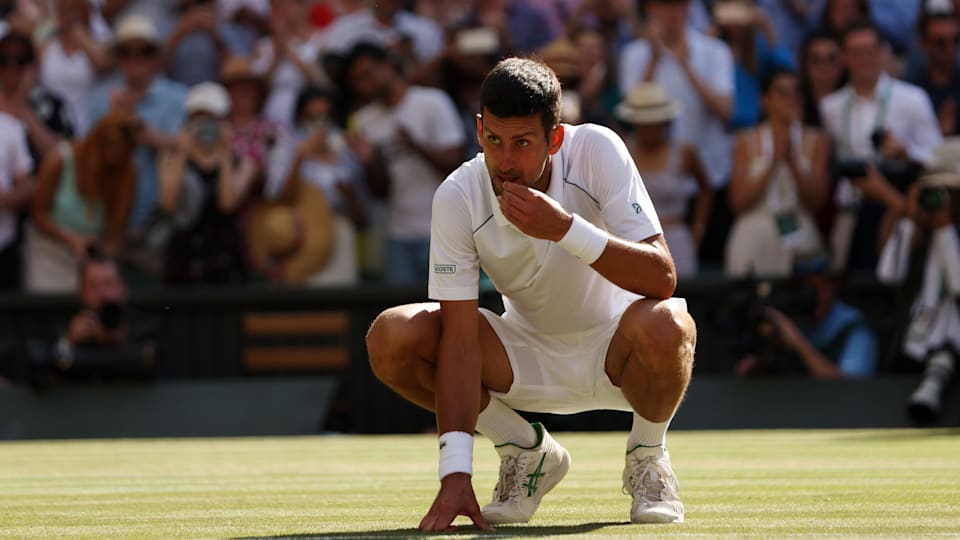Novak Djokovic's life and career-changing gluten-free diet
The record-breaking 24-time Grand Slam men's singles champion famously improved his tennis performance after switching to a gluten-free diet – but what exactly does the Serbian eat? Olympics.com finds out in part one of a new series about athletes' diets.

On winning his latest Wimbledon title, in 2022, Novak Djokovic knelt on the scuffed-yet-still-somehow-immaculate lawn of Centre Court, picked a blade of grass and munched on it, as has been his custom for the seven-times the Serbian has won the iconic tournament.
Thankfully, vegetation is very much part of the 36-year-old's strict nutrition regime, which he credits with his longevity and success in tennis.
But what exactly does Djokovic eat? How and when did the turnaround come about, and what changes did it make?
Olympics.com finds out.
Food for thought for Novak Djokovic
Prior to 2010, Djokovic had won one Grand Slam, the 2008 Australian Open, however, mid-match collapses due to fitness issues were becoming a problem.
While in Croatia for a Davis Cup tie in 2010, Djokovic's trajectory changed when he met with Dr Igor Cetojevic, a nutritionist and fellow Serb who diagnosed a gluten and dairy sensitivity.
Baby steps first, as who wants to remove pasta, cheese, and bread from their diet, especially when the family owned a pizzeria? The Belgrade native adapted to a strict gluten-free diet for two weeks and the results were immediate.
With better sleep, more energy and a lightness on his feet, Djokovic was convinced, even more so after tucking into a bagel following the fortnight without gluten, which left him feeling fatigued and unfit.
At the end of the year of working together, in 2011, Djokovic had won three out of the four Grand Slams, with only Roland-Garros eluding him.
In his 2014 book, Serve to Win, Djokovic wrote: "Suddenly there was an X factor, a change in my diet that allowed my body to perform the way it was meant to."
That change has led to a record-breaking 10 Australian Open titles plus three French Open crowns, seven Wimbledon victories and four US Open triumphs, and he's not done yet.
But what does Djokovic actually eat, and how exactly does it help him?
What does Novak Djokovic eat?
Vegetables, beans, white meat, fish, fruit, nuts, seeds, chickpeas, lentils and healthy oils are the main staples of Djokovic's meal-times, with his day starting with a glass of warm water and lemon, citing that it 'helps his body detoxify'.
He then eats, "a breakfast perfectly calibrated to my body for the day ahead - the same breakfast almost every day of my life," he writes.
The 'energy-boosting bowl' consists of mixed seeds, mixed nuts, gluten-free muesli, berries, strawberries, banana, and yoghurt. A glass of celery juice and a green smoothie follow, full of antioxidant-rich ingredients, the latter including peas, celery, apple juice, mint, spinach, and kale.
A mid-morning snack, if needed, could be crackers with avocado and tuna, mid-afternoon might be an apple with cashew butter.
Lunch, a mixed green salad, spicy soba noodle salad or gluten-free pasta with vegan cheese.
A whole lemon-roasted chicken for dinner with mixed green salad and carrot and ginger soup; or kale Caesar salad plus dressing, including anchovies or sardines, minestrone soup; salmon fillets (skin on) with roasted tomatoes and marinade.
Novak Djokovic is renowned for elasticity of body as seen here in the 2022 Wimbledon final against Nick Kyrgios
Holistic approach to life for Novak Djokovic
The influence of Dr Igor Cetojevic has been critical to Djokovic's life and career, with yoga and meditation also other important staples of his holistic approach, but it's the nutrition aspect that has had the biggest impact.
“Life brings different problems and dietary questions that needed to be resolved," Cetojevic said on his website, drigor.org. "By observing Nole on a daily basis I could know what to suggest and how best to work with him and his support team. Constant travel meant constant changes of environments each presenting different issues to be resolved.
"The best player will not necessarily win," he said. "The winner is the person who can best adapt to his or her surroundings and maintain an equilibrium physically, mentally, and emotionally.”
Describing himself now as "a great student of wellness", Djokovic had to play his own part early in the relationship in order to benefit from Cetojevic's advice, and being disciplined enough to follow through.
“If you want something to be different in your life, you have to make some changes," said Cetojevic. "When we establish our main goals, we can proceed. I counsel and advise my patients in order to establish trust in me and also trust in him or herself to know that everything is possible.”
Even winning 24 Grand Slams, apparently.
